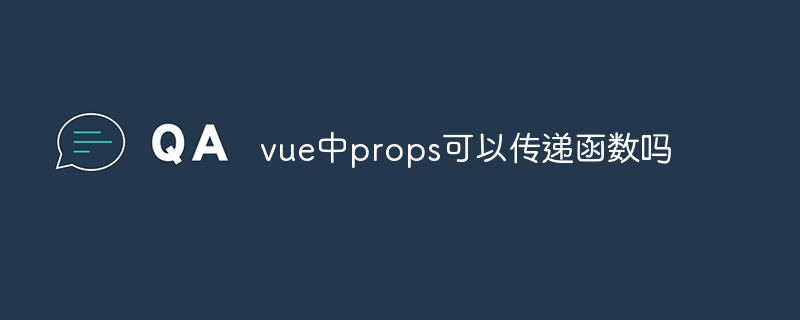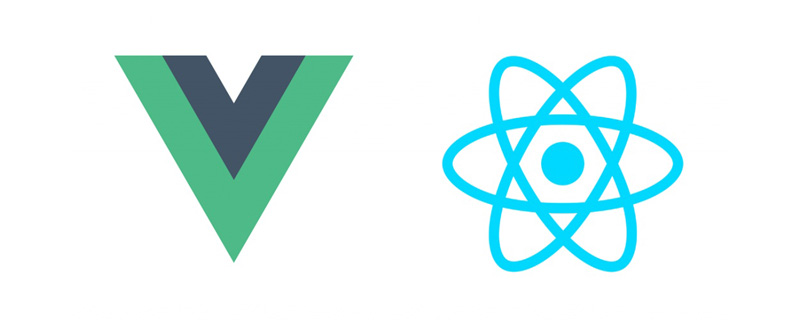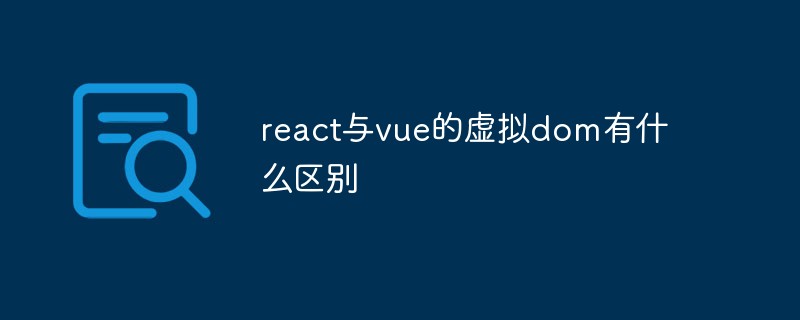Prop in Vue.js is a communication mechanism that allows child components to receive data from parent components and modify these data. Prop defines the data types and default values that child components can receive. The advantages of Props include data encapsulation, data validation, and parent component control. When using Prop, the parent component passes data to the child component through the props attribute. The child component declares the Prop names and types it accepts through the props option, and uses this.foo to access the value of the Prop. Props can have primitive, array, object or function types and support specifying default values.

What are Props in Vue.js?
Prop in Vue.js is a communication mechanism between components, allowing child components to receive and modify data passed in from parent components. It is essentially a special property that defines the data types and default values that a child component can receive from its parent component.
How Prop works:
When a parent component passes data to a child component, it passes the data through the Prop property. In child components, Props can be declared via the props option, which specifies the Prop names and types that the child component can accept.
Main advantages of Prop:
- Data encapsulation: Prop allows child components to receive data without directly accessing the state of the parent component . This helps keep components reusable and maintainable.
- Data validation: Prop can specify the data type, which helps prevent incorrect data from being passed into child components.
- Parent component control: The parent component has final control over the data passed to the child component through Prop.
How to use Prop:
In the parent component, use the props attribute to pass data to the child component:
<Child-Component :foo="myData" />
In the child component, declare the Prop using the props option:
export default {
props: ['foo'] // foo 是一个 Prop 名称
}In the child component, the value of the Prop can be accessed through this.foo.
Types of Prop:
Prop can have the following data types:
- Basic types (e.g. string, number, boolean)
- Array
- Object
- Function
Default value of Prop:
If not provided prop value, you can use the default option to specify a default value:
export default {
props: {
foo: {
type: String,
default: 'default value'
}
}
}The above is the detailed content of What does prop mean in vue. For more information, please follow other related articles on the PHP Chinese website!
 vue中props可以传递函数吗Jun 16, 2022 am 10:39 AM
vue中props可以传递函数吗Jun 16, 2022 am 10:39 AMvue中props可以传递函数;vue中可以将字符串、数组、数字和对象作为props传递,props主要用于组件的传值,目的为了接收外面传过来的数据,语法为“export default {methods: {myFunction() {// ...}}};”。
 聊聊vue指令中的修饰符,常用事件修饰符总结May 09, 2022 am 11:07 AM
聊聊vue指令中的修饰符,常用事件修饰符总结May 09, 2022 am 11:07 AM本篇文章带大家聊聊vue指令中的修饰符,对比一下vue中的指令修饰符和dom事件中的event对象,介绍一下常用的事件修饰符,希望对大家有所帮助!
 如何覆盖组件库样式?React和Vue项目的解决方法浅析May 16, 2022 am 11:15 AM
如何覆盖组件库样式?React和Vue项目的解决方法浅析May 16, 2022 am 11:15 AM如何覆盖组件库样式?下面本篇文章给大家介绍一下React和Vue项目中优雅地覆盖组件库样式的方法,希望对大家有所帮助!
 react与vue的虚拟dom有什么区别Apr 22, 2022 am 11:11 AM
react与vue的虚拟dom有什么区别Apr 22, 2022 am 11:11 AMreact与vue的虚拟dom没有区别;react和vue的虚拟dom都是用js对象来模拟真实DOM,用虚拟DOM的diff来最小化更新真实DOM,可以减小不必要的性能损耗,按颗粒度分为不同的类型比较同层级dom节点,进行增、删、移的操作。


Hot AI Tools

Undresser.AI Undress
AI-powered app for creating realistic nude photos

AI Clothes Remover
Online AI tool for removing clothes from photos.

Undress AI Tool
Undress images for free

Clothoff.io
AI clothes remover

AI Hentai Generator
Generate AI Hentai for free.

Hot Article

Hot Tools

Atom editor mac version download
The most popular open source editor

Dreamweaver CS6
Visual web development tools

Safe Exam Browser
Safe Exam Browser is a secure browser environment for taking online exams securely. This software turns any computer into a secure workstation. It controls access to any utility and prevents students from using unauthorized resources.

MantisBT
Mantis is an easy-to-deploy web-based defect tracking tool designed to aid in product defect tracking. It requires PHP, MySQL and a web server. Check out our demo and hosting services.

Zend Studio 13.0.1
Powerful PHP integrated development environment










